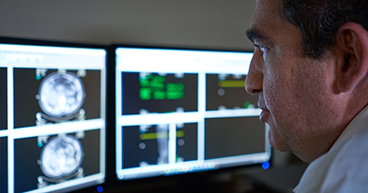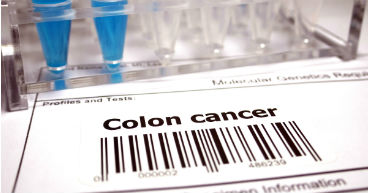
An alarming increase in colorectal cancer cases among young people is continuing to trend in the wrong direction, new research indicates. Colorectal cancer is being diagnosed in increasing numbers in teenagers. In some cases, the disease has been found in patients as young as 10.
According to researchers from University of Missouri-Kansas City, between 1999 and 2020, colorectal cancer cases in the United States have risen:
- 500 percent in children ages 10 to 14
- 333 percent in teens ages 15 to 19
- 185 percent in young adults from 20 to24
“Colorectal cancer is no longer considered just a disease of the elderly population,” lead researcher Islam Mohamed, MD, tells Inside Precision Medicine.
The trend has doctors and researchers scrambling to stem the tide of new cases of the disease in young people and determine the cause for the sharp rise.
In this article, we’ll explore:
If you or a loved one has been diagnosed with colorectal cancer and you’re interested in getting a second opinion on your diagnosis or treatment options, call us or chat online with a member of our team.
Can kids get colon cancer?
Children rarely get cancer. Less than 10,000 of the nearly 2 million new cases diagnosed in the United States every year are children younger than 14. Less than 3 percent of all cancers are diagnosed in people under age 34.
Still, adolescents and young adults do get cancer. But colorectal cancer is not high on the list of cancers that strike young Americans, especially among those in their teens and younger. Of the approximate 150,000 new cases of the disease diagnosed each year, 0.3 percent are in people younger than 20.
The most common types of pediatric cancers are leukemia, lymphoma and cancers of the central nervous system.
Colon cancer in teens
When superstar actor Chadwick Boseman died of colorectal cancer in 2020 at the age of 43, his death spotlighted the trend of more young adults being diagnosed with the disease.
Overall, deaths and new diagnoses of colorectal cancer in the United States have been declining, largely because of increased screening and early detection in seniors. From 1985 to 2019 new cases of colorectal cancer in seniors declined from 65 per 100,000 to 34 per 100,000 Americans. Deaths fell by half to 13 per 100,000.
For Americans younger than 55, however, new cases nearly doubled from 11 percent to 20 percent from 1995 to 2019. Colorectal cancer is the leading cause of cancer deaths for Americans 20 to 49 years old.
Now, enter teenagers.
While the raw numbers of children diagnosed with colorectal cancer are still low, the trending uptick has concerned researchers. Colorectal cancer cases have increased:
- From 0.1 per 100,000 in 1999 to 0.6 per 100,000 in 2020 in children 10 to 14
- From 0.3 per 100,000 in 1999 to 1.3 per 100,000 in 2020 in teens 15 to 19
- From 0.7 per 100,000 in 1999 to 2 per 100,000 in 2020 in young adults 20-24
What causes colorectal cancer in younger people?
While the exact cause of anyone’s colorectal cancer may never be known, the risk factors for the disease are well documented.
Age is a leading risk factor for colorectal cancer. The average age of a person at diagnosis is 66 (down six years since 2001). Other risk factors include:
- Smoking
- Drinking alcohol
- Obesity
- Poor diet
- Sedentary lifestyle
- Family history of chronic bowel disease or cancer
But the root cause of the increase in colorectal cancer in young adults is unknown.
Children have yet to be exposed to a lifetime of risk factors, such as pollution or sunlight. They are not likely to have smoked or drank alcohol, at least not regularly or to excess. Nor have they lived long enough to experience the cumulative effects of decades of bad habits, such as eating a poor diet or being inactive.
“There are thoughts that childhood obesity is contributing,” Toufic Kachaamy, MD, a gastroenterologist and Chief of Medicine at City of Hope® Cancer Center Phoenix. “We know that traditionally a polyp takes five to 10 years to turn into cancer. The usual risk factors for polyps and cancer typically take years to impact the colon so the risk for teenagers is puzzling.”
Researchers at Ohio State University suggest a high-fat, low-fiber diet may be contributing to the colorectal cancer surge in young people. Such a diet may upset the balance in the human microbiome, the colonies of good and bacteria that swim in the digestive system.
Scientists have long believed the microbiome plays an essential role in tumor growth suppression and our overall health. A poor diet may promote the growth of pathogenic microbes, which may promote inflammation, a known risk factor for cancer.
“There is some data suggesting that the quality of the food and the impact on the microbiome (the bacteria that live in the colon) is a contributing factor but it is still too early to tell.” Dr. Kachaamy says.
Teens and young adults are not likely to be screened for the disease, nor should they be, Dr. Mohamed, study leader at the University of Missouri-Kansas City says, since the numbers of cases is still very low. However, Dr. Mohamed says, “It’s important that the public is aware of signs and symptoms of colorectal cancer.”
Common symptoms of the disease among young people include:
- Bowel changes, such as diarrhea or constipation
- Rectal bleeding or bloody stool
- Abdominal pain
- Anemia
“Younger patients tend to have a lot of reserves and their symptoms might persist for a long time before they lead them to seek medical care,” Dr. Kachaamy says. “Symptoms such as bleeding, change in stool caliber and bowel habits and/or frequency should alert someone to discuss it with their clinical provider.”
Dr. Kachaamy’s advice for young people and their parents to reduce the risk of cancer: “Increase physical activity, avoid fast food and low-quality food and increase your intake of fiber, fruits and vegetables,” he says. “Know your risk factors, such as family history of early colorectal cancer, and discuss it with your doctor.”
If you or a loved one has been diagnosed with colorectal cancer and you’re interested in getting a second opinion on your diagnosis or treatment options, call us or chat online with a member of our team.



